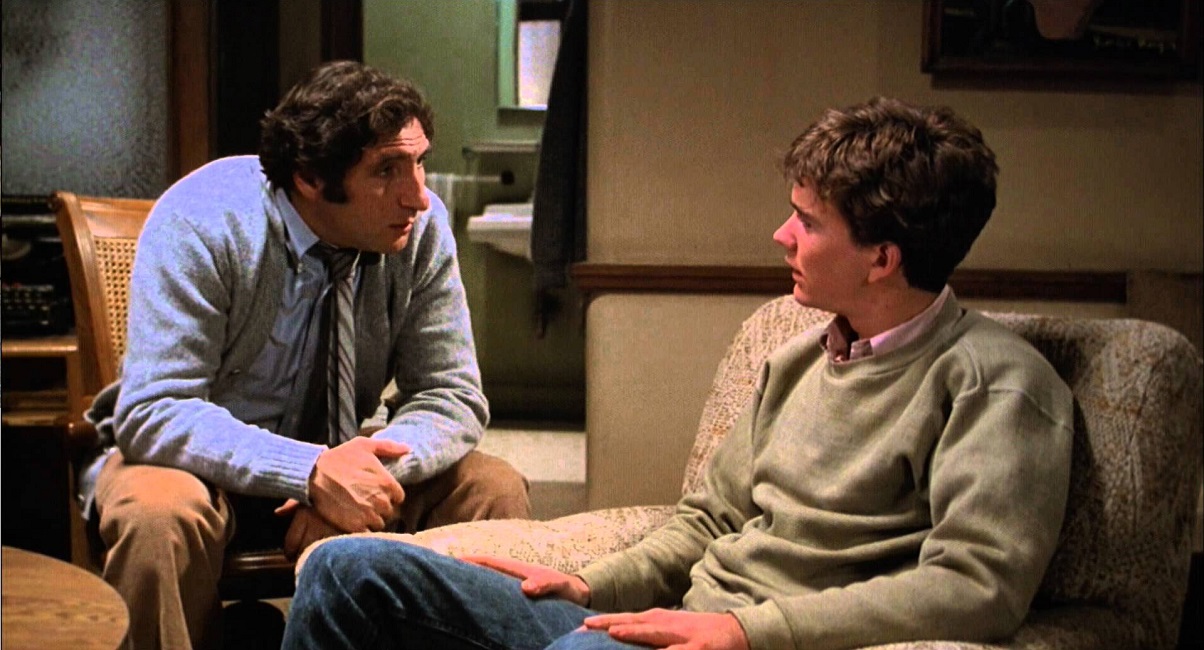"Uh... I don't know. It was like... falling into a hole. It keeps getting bigger and bigger and you can't escape. All of a sudden, it's inside... and you're the hole. You're trapped. And it's all over. Something like that. It's not really scary... except when you think back on it."
Con tries to explain his suicide attempt to Jeanine.
Ordinary People tells the story of a family at odds with itself after the death of the eldest son in a boating accident.
The youngest son, Conrad, played by Timothy Hutton in the film survives the boating accident which killed his brother and has left the family devastated.
Conrad is left with survivor's guilt, at least partially due to having clung to the boat during the unexpected storm and lived.
But there is much more to the story.
Unusually for a Hollywood picture, the "happy" ending brings us to a reckoning where the emotionally stranded Beth (played with intricate narcissism by Mary Tyler Moore) abandons her family in the wake of a realisation that things can't and won't be the same.
Threatened by the growing closeness of father and son, and the need to incorporate the emotional consequences of Bucky's death and Conrad's suicide attempt, Beth packs a suitcase and calls a taxi, leaving the family home in the middle of the night after a watershed conversation with her husband.
Beth's need for everything to be wrapped up nicely with the appearance of perfection becomes a more imminent threat to the emotional health of the family after Bucky's death and Conrad's illness. She is a mother of shiny surfaces, perfect table settings and cocktail parties where family vulnerabilities, including Conrad's need to see a psychiatrist, are never aired in public.
Bucky's death provides the cataclysm that breaks the family's coping strategies apart.
Without that event, audiences speculate (with Cal) that perhaps they could have survived, with Conrad keeping his misgivings regarding Beth to himself, but I am not so sure.
Conrad's depression seems to be a mix of survivor guilt, anger at his mother, and a much deeper sadness.
The feelings of worthlessness that contribute to his depression make him take out his anger on himself. His psychiatrist encourages him to sift through and express the feelings which he has been repressing and which seem to have swallowed him whole, absorbing his will to live.
In exploring these issues, it’s important to look closely at Con's relationship with his mother and how this has affected his ability to cope with his brother's death - and his own survival.
Beth does not seem to be a good enough parent.
She views everything as a reflection on her and there is no room in her relationship with her surviving son for feelings which are messy, unmediated or don't coincide with her own thinking. She just can't seem to understand, acknowledge or accept that others may have a point of view which differs from hers.
Empathy definitely isn't her strong point.
At one stage in therapy, Conrad angrily accuses Beth of having been more concerned by the damage to her bathroom tiles than by her son's suicidality.
Part of the problem and the reason for his depression is that he feels unable to express his anger and disappointment at his mother and his guilt over the boat accident. Although the film argues that a part of Beth died with Bucky, my sense is that she has been narcissistic for a long time, and that her ability to parent has been severely truncated by this primal soul wound.
In his "adaptive reparenting" of Conrad, Dr. Berger allows the young man to express his long-repressed wounded feelings: the anger, hurt, guilt and shame. Eventually we reach the therapeutic catharsis of reliving the accident, where his seemingly stronger brother gets tired, slipping from safety into the water, while Conrad hangs on.
As part of his therapy Con is encouraged to forgive both himself and his mother, before he can move on.
Although I love Judd Hirsch in this wonderfully empathetic role, I feel that forgiveness is not necessarily a realistic goal for Conrad. Certainly he seems to end the film as a more mature and emotionally open person than his mother will ever be, but does he need to forgive her to reach this point?
I would also argue that the idea that Beth "loves him as much as she is able" is also somewhat rose-coloured, letting her off the hook for the limitations that have traumatised all of them. My experience of severe narcissism tells me that love is not something of which sufferers are capable. Need, yes, admiration, perhaps, but not the kind of love that children need and not love as most of us would define it.
Forgiveness is not necessarily the ultimate goal in psychotherapy - self-knowledge yes, understanding the limitations of our parents and how they have affected us, certainly, but forgiveness?
It can take years to even begin to understand our own trauma and how we can and do live alongside it everyday. To reach the point of understanding and forgiving those who have wounded us - well perhaps that is a lifetime's work.






















